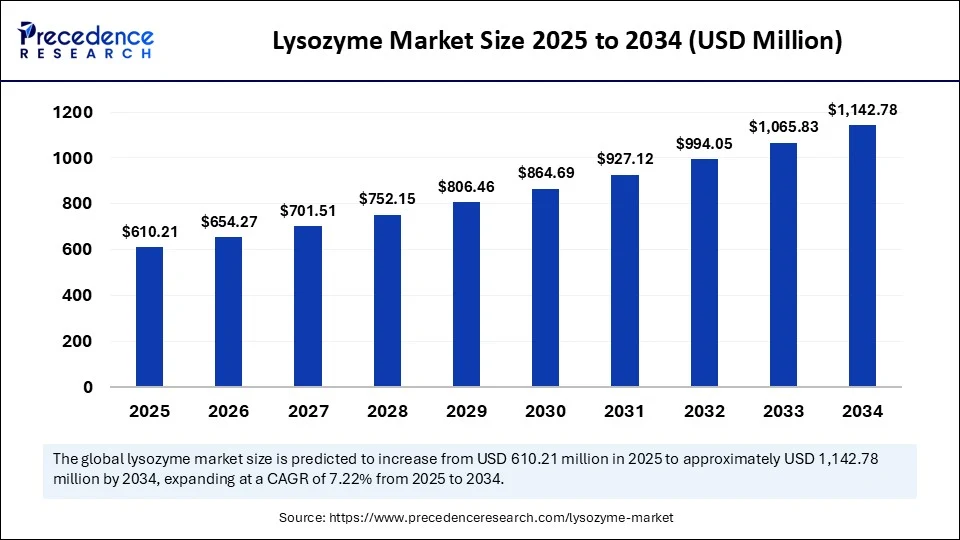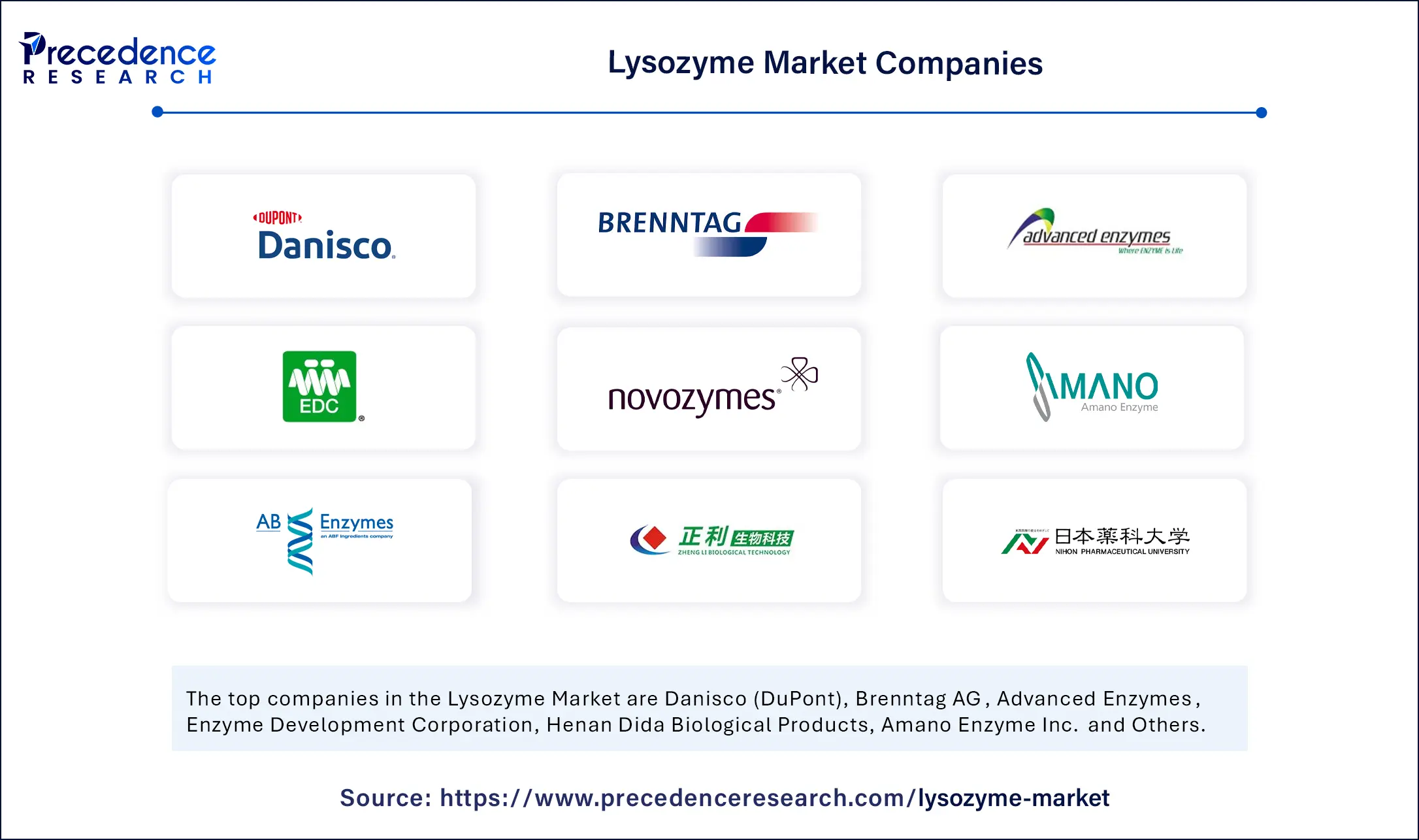
Market Key Takeaways
The Lysozyme Market is firmly anchored in its reputation as a natural, potent antimicrobial agent. North America remains the dominant region, while Asia-Pacific is rapidly closing the gap driven by expanding food processing and pharmaceutical sectors.
Egg-white sources represent a majority share, though microbial and plant-based origin lysozymes are gaining momentum. Powder forms are most prevalent, but liquid and granulated versions are growing thanks to their processing benefits.
Artificial Intelligence of Market
The Lysozyme Market is gradually adopting AI to drive innovation and efficiency. Advanced AI platforms now assist in designing enzyme variants with improved pH and thermal stability, leveraging generative modeling techniques used in protein engineering. AI-controlled bioprocessing systems enhance fermentation efficiency and purification workflows.
Supply chain optimization tools forecast demand fluctuations, aligning production with market trends. Moreover, AI is unlocking opportunities in de novo enzyme discovery tailored for specific applications—such as targeted wound care formulations or specialized food preservation—through machine learning-driven protein design.
Market Overview
Lysozyme—a naturally occurring antimicrobial enzyme—finds broad use as a preservative and therapeutic agent. The majority of production stems from egg whites, but an increasing shift is underway toward microbial and novel biosynthetic sources. End consumers include the food and beverage sector (extending shelf-life), pharmaceuticals (infection control), cosmetic and skincare (antimicrobial formulations), and animal health (feed additives).
Powder remains the dominant form for its stability and ease of use, while liquid and granule versions are preferred in high-volume and specialized processing environments. The market is influenced by evolving health trends, ethical preferences, and regulatory frameworks.
Drivers
The Lysozyme Market is fueled by:
-
Natural Preservation Demand: Growing interest in clean-label and health-oriented products drives use in both food and personal care sectors.
-
Alternative to Antibiotics: Increasing concerns over antibiotic resistance elevate lysozyme’s role in healthcare and animal nutrition.
-
Technological Advances: New production routes—fermentation, synthetic biology—offer potential for cost reduction and sustainable sourcing.
-
Rising Therapeutic Applications: Leveraging its antimicrobial and anti-inflammatory traits, lysozyme is finding new roles in wound care and mucosal therapies.
-
Evolving Consumer Preferences: Demand for plant-based, animal-friendly ingredients supports expansion into vegan and ethical product lines.
Market Trends
Noteworthy trends in the Lysozyme Market include:
-
Source Diversification: Emphasis on moving from animal-derived to microbial and plant-based supply chains for ethical and regulatory compliance.
-
Broadened Usage Scenarios: Expanding into niche applications like oral care, functional cosmetics, and probiotic-enhanced food items.
-
Production Efficiency: Bioreactor optimization, continuous purification systems, and recombinant DNA techniques are gaining traction.
-
Holistic Wellness Positioning: Marketing lysozyme as an immune-supportive, skin-protective, and health-affirming ingredient beyond its preservative use.
-
Collaborative Innovation: Partnerships between biotech firms, food brands, and pharma companies catalyze novel lysozyme-based products.
Opportunities
The Lysozyme Market presents multiple opportunities:
-
Functional Nutrition Growth: Integration into immune-supporting foods and beverages.
-
Pharmaceutical Expansion: Formulation into smart wound dressings, respiratory therapies, and infection-resistant coatings.
-
Animal Health Integration: Inclusion as a replacement for antibiotic growth promoters in livestock feed.
-
Sustainable Production Scaling: Establishing eco-friendly microbial or plant-based production systems to ensure supply resilience.
-
Personalized Healthcare Products: Tailored lysozyme formulations for targeted consumer wellness regimes and personalized medicine.
Challenges
The Lysozyme Market must overcome several challenges:
-
Cost and Scalability: High production costs—especially for traditional extraction methods—limit widespread adoption.
-
Regulatory Hurdles: Navigating diverse global regulations for food, pharma, and cosmetic applications complicates expansion.
-
Functional Limitations: Sensitivity to pH, temperature, and allergenicity constrains formulation flexibility.
-
Consumer Misconceptions: Lack of awareness in certain markets regarding lysozyme’s benefits may slow uptake.
-
Competitive Alternatives: Synthetic preservatives and competing natural enzymes may capture market share in some use cases.
Recent Developments
Recent shifts in the Lysozyme Market include:
-
Clean-Label Momentum: Food and personal care sectors increasingly position lysozyme as a natural antimicrobial alternative.
-
Alternative Sourcing Progress: Microbial fermentation and plant-derived lysozyme variants are advancing towards mainstream production.
-
Technological Enhancements: Research into PEGylation and other modifications is enhancing lysozyme stability and performance.
-
Post-Pandemic Recovery: As supply chains normalize, sectors affected during COVID-19—such as food and cosmetics—are returning to growth trajectories
Lysozyme Market Top Companies

- Danisco (DuPont)
- Brenntag AG
- Advanced Enzymes
- Enzyme Development Corporation
- Henan Dida Biological Products
- Hangzhou Ruibang Biotechnology
- Novozymes
- Amano Enzyme Inc.
- Tianjin Binhai Chemical Industry Group
- Lysobact
- AB Enzymes
- Jinan Shengquan New Materials
- Changsha Zhengbang Bio-technology
- Nihon Pharmaceutical
- Shaanxi Huike Botanical Development
- Shandong Longli Bio-Technology
- DSM
- Jinan Jianfeng Natural Product
- Jiangsu Yonghui Biotechnology
- Qufu Shengjin Biological Engineering
Also Read@ https://www.pharma-geek.com/segmented-flow-analyzer-market/
- Estrogen Replacement Therapy Market Size to Reach USD 19.46 Billion by 2034 - September 18, 2025
- Peptide Therapeutics CDMO Market Report Size, Share & Forecast 2034 - September 17, 2025
- Rare Musculoskeletal Disorder Treatments Market Size, Share & Future Trends 2034 - September 17, 2025
